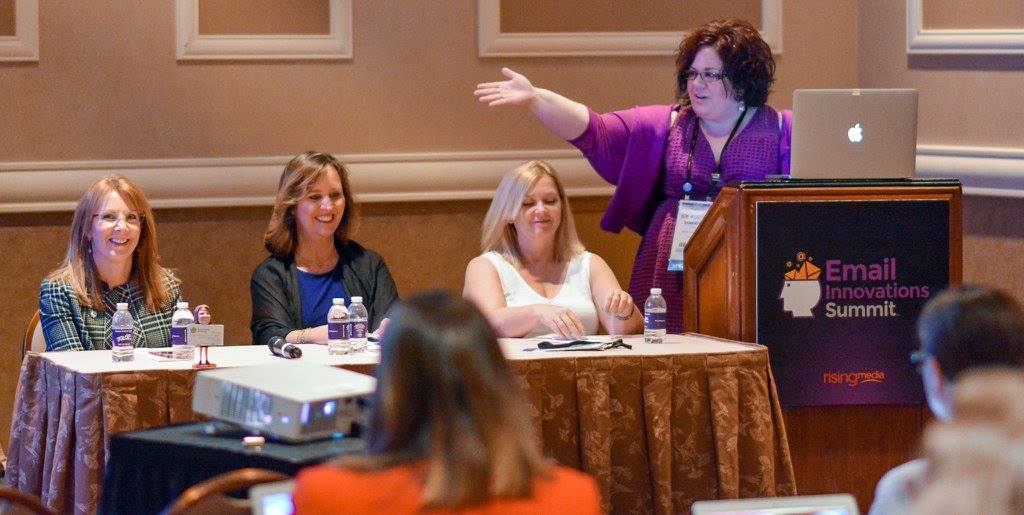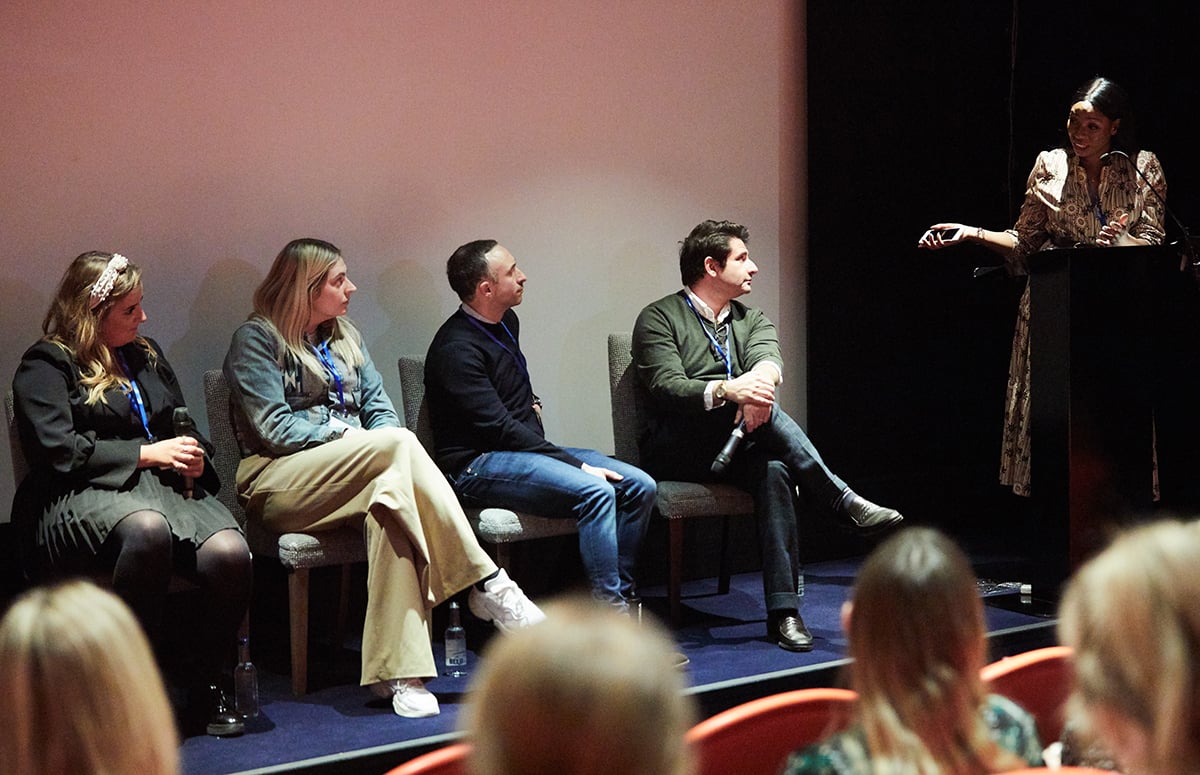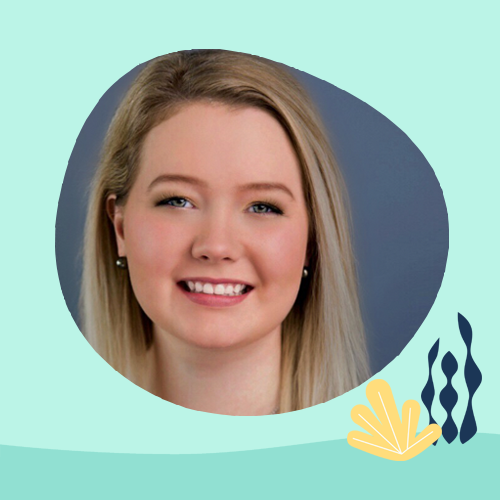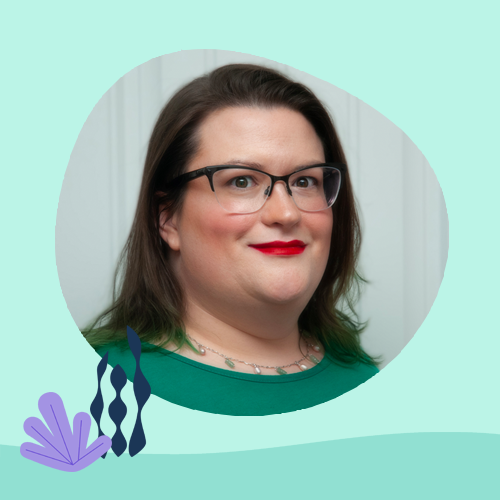Marketing has traditionally been considered a career path well suited to women. And it’s often been an industry where you’ll generally find a healthy ratio of women to men.
Yet this gender diversity has not always translated to more public arenas. Like industry conferences and events. For a long time, speaking panels have been heavily swayed in favour of men.
But there have been a number of women blazing a trail as keynote speakers in email marketing. One of those women is business founder and renowned trainer Kath Pay.
Named one of the world’s top email marketing influencers, she’s a strong advocate of getting more women on stage to share their expertise in marketing. And with International Women’s Day approaching, I was keen to get her insights into the lack of gender diversity and what can be done about it.
You’ve done a lot of training and tutoring over the course of your career. How important would you say mentoring is for women in this industry?
Well, I’m going to give you a long answer, but I think I need to give some context to it. So first of all, email marketing and CRM are very technology driven industries. And that’s often where everyone gets started. Many of the roles that females have are campaign creation roles. There’s a whole range of roles within that area there – the deployers, the coders, the designers, campaign managers etc, and this is where they begin their journey in email.
It’s also important to note that essentially email is a channel that you fall into. I ask this question often of my students and audiences “Who has ever graduated from university and said ‘I’m going to become an email marketer’?” The answer is always ‘no’. So it’s generally a career that happens by chance – you can’t go to university and study email marketing specifically.
Therefore, the nurturing and the mentoring is incredibly important. Because it’s really how they get to find out about how to do their role well, allowing them to move further up the ladder. And then as women, with it still being a very male-oriented industry because it is technology-led, we have a few additional barriers for us to move up the ranks.
You’re a member of Women of Email – how has this network in particular helped you, and what need do you think it answers in the industry?
I think it services a need in the industry and enables women to be nurtured in a safe place, which allows them to be more confident to ask questions they wouldn’t necessarily ask in a mixed forum. I’ve just written an article which actually refers to this point.
Email marketing is very much a best-practice channel and I’ve found many women are very hesitant and nervous about broaching questions that might make them look like a novice. They really need that safe haven. So, to a certain extent, I think that the Women of Email provides a safety net – that sort of nice place for female email marketers to come and ask those questions without feeling like someone’s going to mansplain it to you.

You’ve spoken at a number of international events. What first inspired you to become a speaker? And have you ever encountered any prejudice against your agenda at these events? Have you ever been passed over for a male speaker?
Absolutely. When I first started speaking, I think there were only two or three other women speaking internationally on email marketing. And it was a tough gig. I was a very experienced speaker with a great track record, but I didn’t get keynotes because they were all given to the males – who were not necessarily as experienced or well-known as myself. The first keynotes I began to get were in Europe. This is really interesting – Europe seems to be much farther advanced than the UK or US when it comes to equal opportunities. The way I would put it would be Europe first, then the UK, then the US when it comes to recognising and giving women fair play and equal opportunities for speaking.
So the actual speaking itself, that was fine. I’ve always had my own business, so I know what to do. A friend actually explained to me that I’m a kind of trailblazer for women in email marketing. He said, “You’re one of the handful of women who have actually gone in and trailblazed that path, which has now enabled women coming after you to be able to more easily get speaking spots and keynotes”. Because a few others and I did the hard work beforehand. To do that we had to take on some male attributes. I’m used to doing that, and I never got upset with it. I just got on doing what I had to do. I knew I was in a man’s industry, so I just went ‘Okay, well that’s the way it is’.
And then, when I began being asked to do keynotes in the UK and USA, I celebrated. This was another breakthrough so all those who come after me are going to find it much easier than I did.

What was the catalyst for organising your own women-led event with Holistic Live?
I’m fortunate enough to have a huge network of marketers who read what I write and enjoy listening to what I say. Many of them I’ve taught, and some are my clients, and the majority are female. And what I have found – because I help a lot of events to get brand speakers, such as our own Holistic Live! Events, Email Innovations Summit, MediaPost’s Email Insiders Summit and others – is that if you go and ask a male to speak, they go “yep, I’m there – not a problem at all”. You ask a female and they go “Oh, I’m not too sure. I’m not sure that I’ve got anything to give of value”. They’re a lot more reticent and haven’t got confidence, and so often need a lot more encouragement and nurturing.
I try to nurture speakers – both male and female – and I try to assist in getting those brand speakers out there. I’m happy to say that I got many of them to market as such. That is one of my passions, because the more we can help each other, the better off it’s going to be for everybody in the industry. To get all female speakers for our upcoming event, wasn’t necessarily intentional, it just happened to be that I only asked females! And they all said ‘yes’ so it was just a nice little celebration.
Sign up for the next Holistic Live! Together @Home event in May
What do you think can be done to interact to address the imbalance of gender diversity in events and more senior roles of the marketing industry?
I can see change is happening, slowly, for sure. There are more women speakers becoming available and there are more women managers coming into the industry – so it all helps. I think part of the problem is that a lot of women who are brand marketers are just not keen on speaking as the reward for effort just isn’t there.
I don’t want to go down this route where I get sucked into an argument with anyone about this. But I know a lot of women marketers who are managers or directors, and their families come first and their job is second. They don’t necessarily have the extra time that’s required to become a speaker. And so they’re not that passionate about it – they go to work and they do a great job. They care about their work, and they love their colleagues and all the rest of it, but they just don’t want to go the extra step to be a speaker.
Whereas it’s different for men. Then combine this with the likelihood of the woman not being as confident as her male counterpart. But again, like I said, I think things are changing. I am seeing that change. And you can hear and read on Women of Email that there are women marketers who are just literally champing at the bit to get out there and start speaking and start becoming more visible and more prominent in the industry. So I do think that it’s changing, which is really exciting.
As far as events go, again, it’s a case of getting diversity – not just gender diversity, but diversity all together. For me, this is really important. Again, we don’t have much overall diversity in email marketing speakers. It tends to be a very white-centric industry for some bizarre reason. And as an event organiser, it’s always good to start thinking about it. So for me the issue is not just more women speakers, but also one of ethnic diversity.
I think it’s worth understanding that there’s two types of speakers – there’s a vendor-speaker and there is a brand-speaker. The win is very obvious to vendor-speakers, and there are lots of vendor-speakers to be had – both female and male. For brand-speakers, there’s really not that much in it for them. They’re not going to get an extra pay rise if they become a recognised speaker and thought leader and they don’t get commission on any sales from anything that happens at the event. So, that’s what makes it tricky when you’re an event organiser and you are running an event with primarily brand speakers or client-side speakers rather than vendor-speakers.
If you’re doing an event that mainly has vendor speakers, you can equally distribute it and say, “Great, we’ll have 50% male speakers, 50% female”, because there’s enough speakers of each gender. But when it comes to brand speakers you have more of a challenge. And again, I think it really just comes down to women marketers wanting to put up their hands and say, “I’m ready, I want to do it, count me in”. I personally think that all the event owners or managers that I know will be falling over themselves to welcome them in and say “Great, we’d love to have you speak!”.
So what advice would you give women who are considering speaking at an event or looking for a more senior role in the industry?
Okay, so I give this advice quite often. Over the years I’ve identified that there’s a journey that is undertaken by speakers and writers.
The first stage of this journey is one where you repeat existing content – of course with your unique flavour of presenting or writing. You take everything that other speakers, other authors, other thought leaders and experts have said. You’re taking that all on board, you’re getting to know it and you will be talking about it, you will be sharing case studies that aren’t yours.
The next stage is to start bringing in your own content and case studies. This is content that you have identified and you have worked with, you have solidified and know it first hand. This is when you start to speak more powerfully, because you know the information intimately, it’s yours. This is when you start to really make an impact. The third stage, which only a handful of people in the industry have ever achieved, is when you introduce unique ideas and new approaches and concepts – these are true thought leaders, and we can do with more of them!
Many speakers are in that first stage, the repeating stage, and I’m not saying that in a belittling way at all. That is often the first step that you need to take to become a speaker or writer. Because you’re taking all the information onboard, you’re assimilating this information – your insights and everything. And then the next stage is when you start owning the content. And for me, it’s exciting to look at the speakers and authors and see which stage they’re at, and see them progress from one stage to the next.
I’m a big believer that when you’re doing the repeating stage, try to reference as much content as possible as it not only gives you more credibility, because you’re referencing other people who have actually done the studies, or conceived the concepts, but you also come across as someone worth listening to.
I see it happening badly a lot. I’ve had multiple occasions where someone has written a blog based upon one of my webinars and they’ve rewritten my content as their own without any attribution to me, but have missed the essence of the point I was making, and I think, “You didn’t really get the concept, did you?”. So I always encourage speakers to attribute. Don’t go over the top, but you know, whatever you think needs to be done. And don’t be embarrassed to call upon others. Even now, with me being in the third stage, I still call upon others to cite. I think that’s a powerful position.
See how Kath and her team can help your business with Holistic Email Marketing consultancy services or follow her on Twitter.


No Comments
Leave a comment Cancel